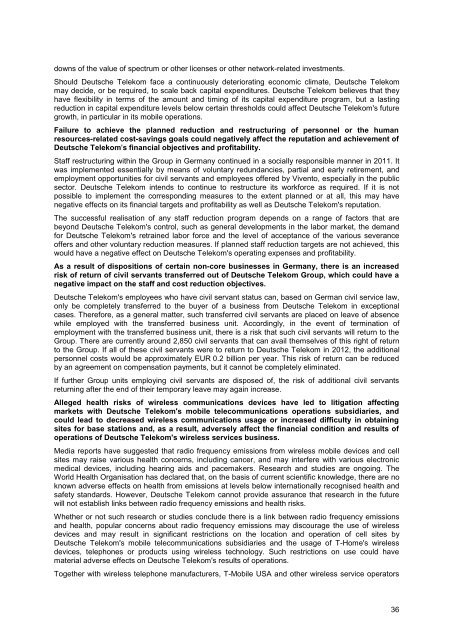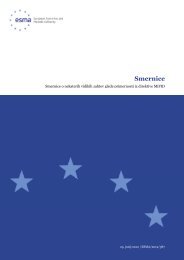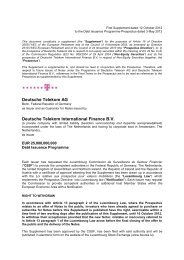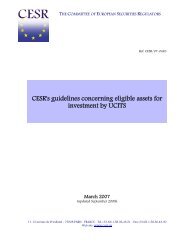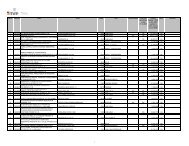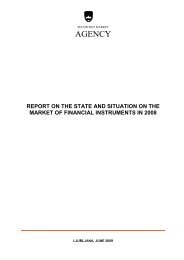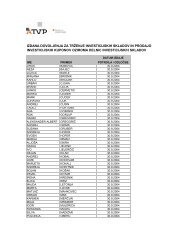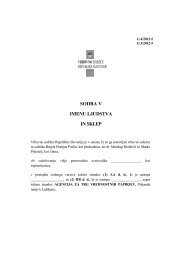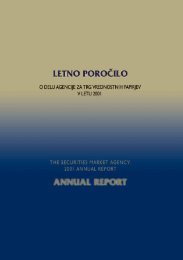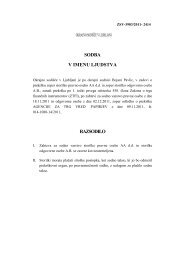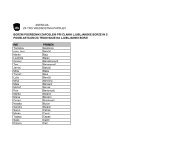downs of the value of spectrum or other licenses or other network-related investments.Should Deutsche Telekom face a continuously deteriorating economic climate, Deutsche Telekommay decide, or be required, to scale back capital expenditures. Deutsche Telekom believes that theyhave flexibility in terms of the amount and timing of its capital expenditure program, but a lastingreduction in capital expenditure levels below certain thresholds could affect Deutsche Telekom's futuregrowth, in particular in its mobile operations.Failure to achieve the planned reduction and restructuring of personnel or the humanresources-related cost-savings goals could negatively affect the reputation and achievement ofDeutsche Telekom's financial objectives and profitability.Staff restructuring within the Group in Germany continued in a socially responsible manner in 2011. Itwas implemented essentially by means of voluntary redundancies, partial and early retirement, andemployment opportunities for civil servants and employees offered by Vivento, especially in the publicsector. Deutsche Telekom intends to continue to restructure its workforce as required. If it is notpossible to implement the corresponding measures to the extent planned or at all, this may havenegative effects on its financial targets and profitability as well as Deutsche Telekom's reputation.The successful realisation of any staff reduction program depends on a range of factors that arebeyond Deutsche Telekom's control, such as general developments in the labor market, the demandfor Deutsche Telekom's retrained labor force and the level of acceptance of the various severanceoffers and other voluntary reduction measures. If planned staff reduction targets are not achieved, thiswould have a negative effect on Deutsche Telekom's operating expenses and profitability.As a result of dispositions of certain non-core businesses in Germany, there is an increasedrisk of return of civil servants transferred out of Deutsche Telekom Group, which could have anegative impact on the staff and cost reduction objectives.Deutsche Telekom's employees who have civil servant status can, based on German civil service law,only be completely transferred to the buyer of a business from Deutsche Telekom in exceptionalcases. Therefore, as a general matter, such transferred civil servants are placed on leave of absencewhile employed with the transferred business unit. Accordingly, in the event of termination ofemployment with the transferred business unit, there is a risk that such civil servants will return to theGroup. There are currently around 2,850 civil servants that can avail themselves of this right of returnto the Group. If all of these civil servants were to return to Deutsche Telekom in 2012, the additionalpersonnel costs would be approximately EUR 0.2 billion per year. This risk of return can be reducedby an agreement on compensation payments, but it cannot be completely eliminated.If further Group units employing civil servants are disposed of, the risk of additional civil servantsreturning after the end of their temporary leave may again increase.Alleged health risks of wireless communications devices have led to litigation affectingmarkets with Deutsche Telekom's mobile telecommunications operations subsidiaries, andcould lead to decreased wireless communications usage or increased difficulty in obtainingsites for base stations and, as a result, adversely affect the financial condition and results ofoperations of Deutsche Telekom's wireless services business.Media reports have suggested that radio frequency emissions from wireless mobile devices and cellsites may raise various health concerns, including cancer, and may interfere with various electronicmedical devices, including hearing aids and pacemakers. Research and studies are ongoing. TheWorld Health Organisation has declared that, on the basis of current scientific knowledge, there are noknown adverse effects on health from emissions at levels below internationally recognised health andsafety standards. However, Deutsche Telekom cannot provide assurance that research in the futurewill not establish links between radio frequency emissions and health risks.Whether or not such research or studies conclude there is a link between radio frequency emissionsand health, popular concerns about radio frequency emissions may discourage the use of wirelessdevices and may result in significant restrictions on the location and operation of cell sites byDeutsche Telekom's mobile telecommunications subsidiaries and the usage of T-Home's wirelessdevices, telephones or products using wireless technology. Such restrictions on use could havematerial adverse effects on Deutsche Telekom's results of operations.Together with wireless telephone manufacturers, T-Mobile USA and other wireless service operators36
are subject to several individual lawsuits asserting product liability, breach of warranty and otherclaims relating to radio frequency transmissions to and from wireless mobile devices. The complaintsseek substantial monetary damages as well as injunctive relief. T-Mobile intends to vigorously defendthese cases. Deutsche Telekom does not know whether legislators, regulators or private litigants willrefrain from taking other actions adverse to Deutsche Telekom, based on the purported health-relatedrisks associated with radio frequency emissions. Any such litigation, legislation or adverse actions mayresult in additional costs and loss of revenues in Deutsche Telekom's mobile communicationsbusinesses.Deutsche Telekom regularly engage in large-scale programs to reshape the informationtechnology ("IT") and network infrastructure to adapt to changing customer needs andorganisational and accounting requirements. The implementation of any of these programsmay require substantial investments and a failure to effectively plan and monitor them couldlead to misallocations of resources and impaired processes with negative consequences forDeutsche Telekom's operations.Deutsche Telekom's IT and network resources and infrastructure represents its organisational andtechnical backbone. This infrastructure is the basis for innovative telecommunications products andservices that Deutsche Telekom offers or plans to offer in the future. Deutsche Telekom implementedcomprehensive programs since 2010 to adapt its IT systems and infrastructure to changing customerneeds and its new organisational structure resulting from the consolidation of its fixed-line and mobilenetworks in Germany. Deutsche Telekom is replacing the various architectures, access types andservices with a standardised architecture. Risks could arise in this area relating to all IT systems andproducts that require Internet access. For example, faults between newly developed and existing ITsystems could cause interruptions to business processes and products, such as smartphones andDeutsche Telekom's comprehensive triple-play offering in Germany, Entertain.Due to the enormous complexity of the implementation of this IT initiative, malfunctions, connectivityissues, implementation delays, inadequate planning and management and other unforeseen problemscould result in costly process impairments and remediation, and possible extended down-times of ITprocesses. These problems could result in revenue losses and may frustrate the attainment ofDeutsche Telekom's goals in terms of cost savings and quality improvements.In addition, one of Deutsche Telekom's most important IT programs deals with the long-termdevelopment and implementation of a comprehensive IP platform that will support both fixed-line andmobile telephony services. This means that the traditional platform will be completely replaced by anIP-based system. Upon implementing this joint IP platform, Deutsche Telekom will be subject to risksinherent in all IT systems connected to the Internet, such as hacker attacks, "spam calls" and otherdisruptions. These risks could lead to a temporary interruption of Deutsche Telekom's IT resourcesand, as a result, impair the performance of Deutsche Telekom's technical infrastructure.In addition, Deutsche Telekom may be required to make substantial IT infrastructure investments inresponse to new accounting standards, such the new IFRS recognition rule, scheduled to be releasedin 2012.System failures due to natural or man-made disruptions and loss of data could result inreduced user traffic and reduced revenues and could harm Deutsche Telekom's reputation andresults.Deutsche Telekom's technical infrastructure (including Deutsche Telekom's network infrastructure forfixed-line network services and mobile telecommunications services) and data may be damaged ordisrupted by fire, lightning, flooding and other calamities, technology failures, human error, terroristattacks, hacker attacks and malicious actions (e.g., theft or misuse of customer data), and othersimilar events. Deutsche Telekom attempts to mitigate these risks by employing a large number ofmeasures, including a comprehensive monitoring of its telecommunications networks, backup systemsand protective systems such as firewalls, virus scanners, and building security. In addition, DeutscheTelekom has implemented a global business continuity management system at its corporateheadquarters. Deutsche Telekom cannot, however, be certain that these measures will be effectiveunder all circumstances, and that disruptions or damages will not occur. Disruption or damage toDeutsche Telekom's infrastructure may result in reduced user traffic and revenues, increased costs,and damage to Deutsche Telekom's reputation.37
- Page 1 and 2: Debt Issuance Programme ProspectusD
- Page 3 and 4: Responsibility StatementDeutsche Te
- Page 5 and 6: to form and content, and all rights
- Page 7 and 8: Maturities:Form of Notes:Fixed Rate
- Page 10 and 11: Summary in respect of Risk FactorsR
- Page 12 and 13: Notes may not be a suitable investm
- Page 14 and 15: Internationalisation and Sustainabi
- Page 16 and 17: German Translation of the SummaryDi
- Page 19 and 20: Besteuerung:Vorzeitige Rückzahlung
- Page 21 and 22: Zusammenfassung der RisikofaktorenZ
- Page 23 and 24: Zusammenfassung der Risikofaktoren
- Page 25 and 26: Unternehmen aus diesem Grund zusamm
- Page 27 and 28: Risk FactorsProspective investors s
- Page 29 and 30: markets. These developments could,
- Page 31 and 32: consumer regulation at the federal
- Page 33 and 34: Existing mobile substitution effect
- Page 35: exacerbated by the global economic
- Page 39 and 40: While Deutsche Telekom believes tha
- Page 41 and 42: exposed to the risk of an unfavoura
- Page 43 and 44: principal under such Notes may even
- Page 45 and 46: Statement of cash flows (page 9 in
- Page 47 and 48: otherwise agreed between the Issuer
- Page 49 and 50: DESCRIPTION OF BUSINESSGroup Organi
- Page 51 and 52: In February 2011, T-Mobile Czech Re
- Page 53 and 54: 2010. The demand for ever-faster da
- Page 55 and 56: Special Requirements Applicable to
- Page 57 and 58: Local Loop AccessDeutsche Telekom h
- Page 59 and 60: Incumbent network operators are obl
- Page 61 and 62: (e.g., avoid disclosure or blocking
- Page 63 and 64: PTC as Deutsche Telekom clarified t
- Page 65 and 66: combinations of businesses where De
- Page 67 and 68: For more information on the effects
- Page 69 and 70: • Other operating expenses increa
- Page 71 and 72: 345Includes expense relating to a c
- Page 73 and 74: investment levels to remain approxi
- Page 75 and 76: products and technologies, these in
- Page 77 and 78: Reconciliation of Net Debt31 Dec. 2
- Page 79 and 80: Deutsche Telekom's cash outflows fo
- Page 81 and 82: 1In addition to the fixed-network l
- Page 83 and 84: Development of Operations2011 2010
- Page 85 and 86: to upgrade its mobile network, prov
- Page 87 and 88:
Czech Republic. Deutsche Telekom ha
- Page 89 and 90:
decrease mobile termination rates,
- Page 91 and 92:
The decrease in adjusted EBITDA in
- Page 93 and 94:
In 2011, the United States operatin
- Page 95 and 96:
The increase in total revenue in 20
- Page 97 and 98:
solutions. It also manages and deve
- Page 99 and 100:
In 2010, T-Systems substantially ex
- Page 101 and 102:
2011 2010 Change ChangeOf which: Vi
- Page 103 and 104:
conditions for additional capital m
- Page 105 and 106:
For additional information on the c
- Page 107 and 108:
Employees in the Group 31 Dec. 2011
- Page 109 and 110:
Civil servants employed by Deutsche
- Page 111 and 112:
Selected Financial InformationDeuts
- Page 113 and 114:
(Vorlagebeschluesse) with respect t
- Page 115 and 116:
Court of Justice annulled these jud
- Page 117 and 118:
having to pay license fees and comp
- Page 119 and 120:
Civil ServantsIn November 2004, Ger
- Page 121 and 122:
majority holdings by 2 May 2015, on
- Page 123 and 124:
Group Accounting manages the proces
- Page 125 and 126:
Deutsche Telekom International Fina
- Page 127 and 128:
Statement of comprehensive incometh
- Page 129 and 130:
Terms and ConditionsThis Series of
- Page 131 and 132:
"Global Note" means [the/any] [Temp
- Page 133 and 134:
interest shall continue to accrue o
- Page 135 and 136:
7 February 1992), the Amsterdam Tre
- Page 137 and 138:
Period is a day other than the 30th
- Page 139 and 140:
[in the case of Definitive Notes in
- Page 141 and 142:
([4]) of this § 6.](b)Notice of re
- Page 143 and 144:
of Stock Exchange], a Paying Agent
- Page 145 and 146:
(f)(g)the Issuer [in the case of No
- Page 147 and 148:
§ 14[(5)] to the Agent. Such notic
- Page 149 and 150:
Garantin] noch der Fiscal Agent ode
- Page 151 and 152:
Bei Rückzahlung oder Zahlung einer
- Page 153 and 154:
(b)Fällt ein Zinszahlungstag auf e
- Page 155 and 156:
[Sofern eine andere Methode der Bes
- Page 157 and 158:
[im Falle von Actual/360: die tats
- Page 159 and 160:
Für diese Zwecke bezeichnet "Zahlt
- Page 161 and 162:
Eine solche Kündigung darf allerdi
- Page 163 and 164:
(i)[Referenz-Preis einfügen] (der
- Page 165 and 166:
[(e)(f)von einer Zahlstelle abgezog
- Page 167 and 168:
(b)(c)(d)die Nachfolgeschuldnerin a
- Page 169 and 170:
eine vertretungsberechtigte Person
- Page 171 and 172:
(d)(e)(f)(iii)(iv)(v)(vi)by reason
- Page 173 and 174:
Non-binding translation of the Guar
- Page 175 and 176:
ganz oder teilweise in irgendeiner
- Page 177 and 178:
Tag der Begebung: [ ]These are the
- Page 179 and 180:
CURRENCY, DENOMINATION, FORM AND TI
- Page 181 and 182:
INTEREST (§ 4) 8ZINSEN (§ 4)o Fix
- Page 183 and 184:
oooooo ISDA Determination 9ISDA-Fes
- Page 185 and 186:
Instalment Amount(s)Rate(n) [ ]Earl
- Page 187 and 188:
GOVERNING LAW (§ 14)ANWENDBARES RE
- Page 189 and 190:
German Securities Code [ ]Deutsche
- Page 191 and 192:
Umfassende Erläuterung darüber, w
- Page 193 and 194:
Various categories of potential inv
- Page 195 and 196:
Commissions 29ProvisionenManagement
- Page 197 and 198:
Die Emittentin hat die Informatione
- Page 199 and 200:
Payment of the flat income tax will
- Page 201 and 202:
Kingdom of the Netherlands.Where th
- Page 203 and 204:
ResidentsAccording to the law of 23
- Page 205 and 206:
(c)account or benefit of, U.S. pers
- Page 207 and 208:
4. United KingdomEach Dealer has re
- Page 209 and 210:
Names and AdressesIssuersDeutsche T
- Page 211:
2010 2010PricewaterhouseCoopers Akt


